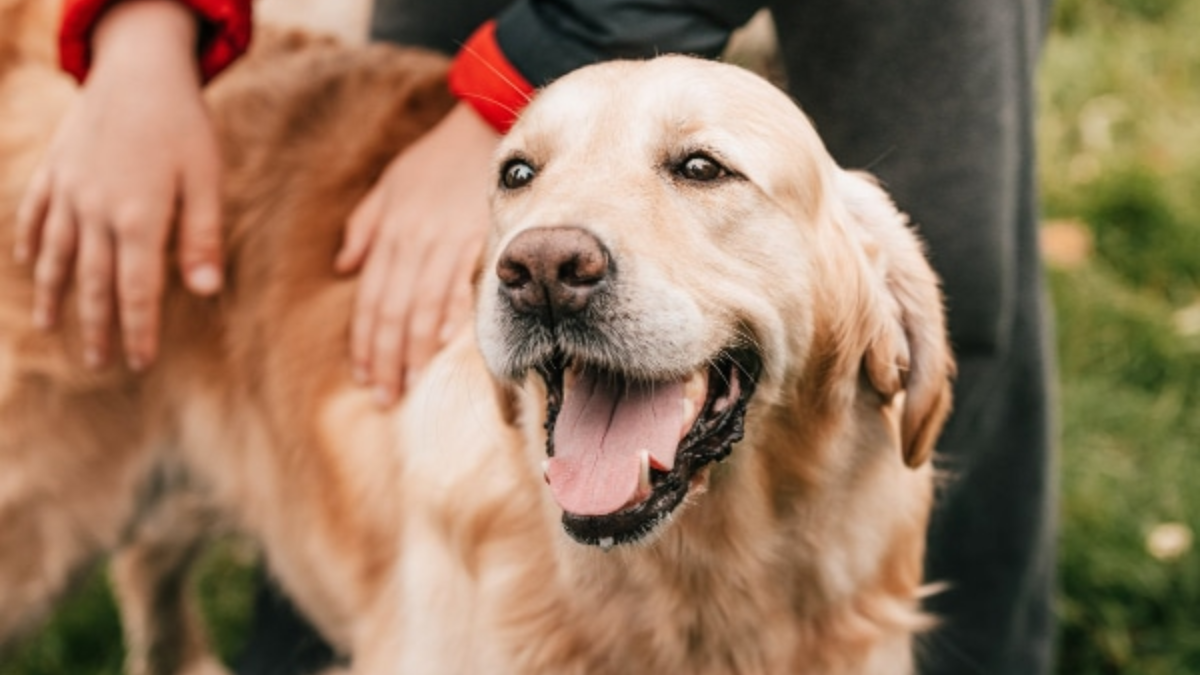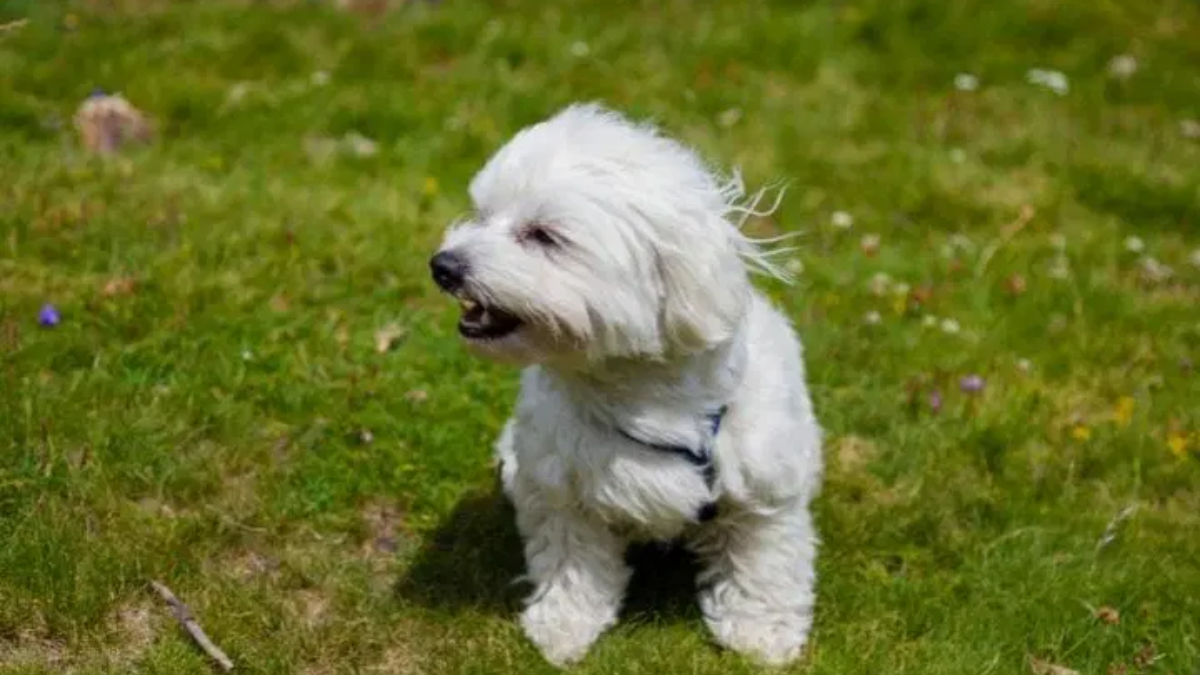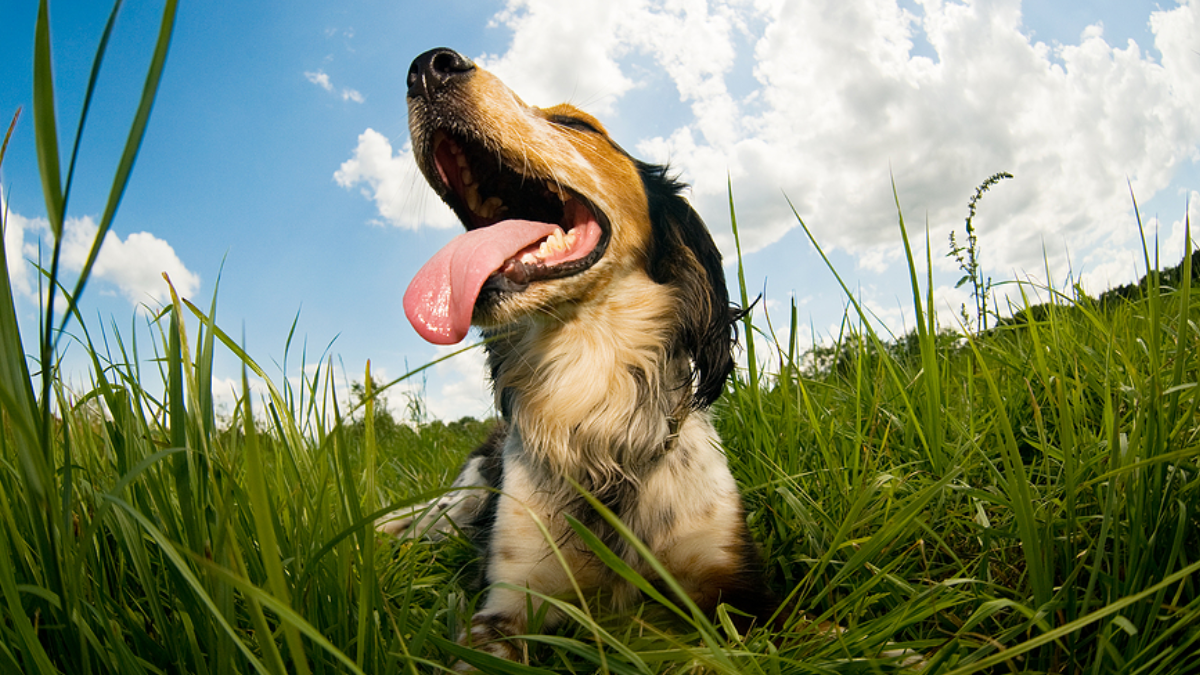Dogs are known for their playful and active nature, but sometimes they can exhibit unusual behavior that may cause concern. One such behavior is rapid breathing or panting. Dog owners may wonder why their furry friend is breathing so fast and what it means. In this article, we will explore the reasons behind rapid breathing in dogs and what it could indicate. So, "Why Is My Dog Breathing So Fast?" Let's delve into the potential causes and implications of this common canine behavior.
Understanding Rapid Breathing Breathing is an essential function that helps dogs regulate their body temperature and oxygen levels. Rapid breathing or panting is a natural response to heat, exercise, or excitement. However, when panting becomes excessive or occurs for no apparent reason, it could be a sign of an underlying problem. To understand why a dog is breathing fast, it is essential to consider the context and any accompanying symptoms.

Common Triggers of Increased Respiratory Rate Several factors can cause a dog to breathe fast, including heatstroke, anxiety, pain, or respiratory infections. Some breeds are also prone to rapid breathing due to their physical characteristics. For example, brachycephalic dogs, such as Pugs and Bulldogs, have short snouts that make it harder for them to breathe normally. Identifying the cause of rapid breathing is crucial in determining the appropriate treatment and preventing further complications.
Key Takeaways
- Rapid breathing in dogs can be a sign of an underlying problem.
- The context and accompanying symptoms are essential in identifying the cause of rapid breathing.
- Heatstroke, anxiety, pain, respiratory infections, and physical characteristics can trigger rapid breathing in dogs.
Understanding Rapid Breathing
Normal Panting vs. Abnormal Breathing
Dogs pant to regulate their body temperature, and it's a normal behavior. However, sometimes, panting can be a sign of an underlying health issue. It's essential to distinguish between normal panting and abnormal breathing to identify if there's a problem.
Normal panting occurs when a dog is hot, excited, or exercising. It's characterized by a steady and rhythmic pattern of breaths. On the other hand, abnormal breathing is irregular, rapid, or shallow. It can be a sign of respiratory distress, pain, or anxiety.

Biological Causes of Fast Breathing
There are several reasons why a dog may be breathing fast. Some of the biological causes of rapid breathing include:
- Heatstroke: Dogs that are exposed to high temperatures for an extended period can suffer from heatstroke. Symptoms include panting, rapid breathing, and lethargy.
- Heart Disease: Heart problems can cause breathing difficulties in dogs. If your dog has a heart condition, they may breathe fast or struggle to catch their breath.
- Respiratory Infections: Respiratory infections can cause coughing, sneezing, and rapid breathing in dogs. If you notice these symptoms, take your dog to the vet immediately.
- Pain: Dogs may breathe fast if they're in pain. It's essential to identify the source of the pain and provide appropriate treatment.
In conclusion, rapid breathing in dogs can be a sign of an underlying health issue. It's crucial to distinguish between normal panting and abnormal breathing to identify if there's a problem. If you notice any unusual breathing patterns in your dog, take them to the vet immediately.
Common Triggers of Increased Respiratory Rate
Dogs are known to breathe faster than humans, but sometimes the rate of breathing can increase significantly. This can be worrisome for pet owners, especially if they notice that their dog is panting excessively. Several triggers can cause an increased respiratory rate in dogs.
Exercise and Excitement
When dogs engage in physical activities such as running, playing, or even going for a walk, their breathing rate tends to increase. This is because their body requires more oxygen to fuel the muscles and maintain their energy levels. Excitement can also trigger an increase in respiratory rate, as dogs tend to pant when they are happy or stimulated.
Heat and Humidity
Dogs do not have sweat glands like humans, so they regulate their body temperature by panting. When the temperature rises, dogs pant to release heat and cool down their body. Humidity can also make it difficult for dogs to regulate their body temperature, as the moisture in the air makes it harder for them to evaporate moisture from their tongue and mouth. This can cause an increase in respiratory rate as the dog tries to cool down.

Stress and Anxiety
Stress and anxiety can also trigger an increase in respiratory rate in dogs. This can be due to a variety of reasons such as separation anxiety, fear of loud noises, or being in an unfamiliar environment. When dogs are stressed or anxious, their body releases adrenaline and other stress hormones which can cause an increase in respiratory rate.
It is important to note that an increased respiratory rate can also be a sign of underlying health issues such as heart disease, respiratory infections, or allergies. If a pet owner notices that their dog is breathing faster than usual and there is no apparent trigger, they should consult with their veterinarian to rule out any underlying health concerns.
Health Concerns Related to Fast Breathing
Fast breathing in dogs can be a sign of an underlying health issue. It is important to identify the cause of fast breathing to ensure that your dog receives appropriate treatment. In this section, we will discuss some of the health concerns related to fast breathing in dogs.
Respiratory Conditions
Respiratory conditions such as pneumonia, asthma, or bronchitis can cause fast breathing in dogs. These conditions can affect a dog's ability to breathe properly and can cause them to breathe faster in an attempt to get enough oxygen. Other symptoms of respiratory conditions may include coughing, wheezing, and difficulty breathing.
Cardiovascular Issues
Cardiovascular issues such as heart disease or heart failure can also cause fast breathing in dogs. These conditions can affect the heart's ability to pump blood effectively and can cause fluid to build up in the lungs. This can make it difficult for a dog to breathe properly and can cause them to breathe faster. Other symptoms of cardiovascular issues may include lethargy, coughing, and weakness.
Pain and Discomfort
Pain and discomfort can also cause a dog to breathe faster. This may be due to an injury, illness, or other underlying condition that is causing them discomfort. Dogs may also breathe faster when they are anxious or stressed. Other symptoms of pain and discomfort may include lethargy, loss of appetite, and changes in behavior.

In summary, fast breathing in dogs can be a sign of an underlying health issue. Respiratory conditions, cardiovascular issues, and pain and discomfort are some of the health concerns related to fast breathing in dogs. If you notice that your dog is breathing faster than usual, it is important to consult with your veterinarian to determine the underlying cause and appropriate treatment.
Recognizing Symptoms of Respiratory Distress
Breathing difficulties in dogs can be a serious and life-threatening condition. Dog owners need to recognize the signs of respiratory distress and seek veterinary care promptly. Here are some key symptoms to look out for:
Signs of Breathing Difficulties
- Rapid breathing (more than 30 breaths per minute)
- Shallow breathing
- Noisy breathing (wheezing, coughing, choking)
- Breathing with an open mouth
- Flaring nostrils
- Bluish or pale gums
- Restlessness or agitation
- Weakness or collapse
If your dog is experiencing any of these symptoms, it is important to act quickly. Respiratory distress can be caused by a variety of underlying conditions, including heart failure, lung disease, or an obstruction in the airway. Without prompt treatment, respiratory distress can quickly lead to organ damage and even death.
When to Seek Veterinary Care
If you suspect your dog is having trouble breathing, it is important to seek veterinary care immediately. Your veterinarian can perform a thorough physical exam, take X-rays or other diagnostic tests, and provide appropriate treatment for your dog's condition.
In some cases, respiratory distress may require emergency care. If your dog is showing signs of severe distress, such as gasping for air or collapsing, it is important to seek emergency veterinary care right away.
Remember, recognizing the signs of respiratory distress and seeking veterinary care promptly can be the key to saving your dog's life.
Diagnostic Methods
Physical Examination
A physical examination is usually the first step in diagnosing why a dog is breathing fast. The veterinarian will check for any abnormalities in the dog's breathing, such as rapid breathing or labored breathing. They will also check the dog's heart rate, temperature, and overall health. The veterinarian may also listen to the dog's lungs with a stethoscope to check for any wheezing or crackling sounds.

Imaging and Tests
If the veterinarian suspects an underlying medical condition, they may recommend further testing. This may include X-rays, blood tests, or an electrocardiogram (ECG). X-rays can help identify any abnormalities in the lungs or heart, while blood tests can detect infections or other medical conditions. An ECG can help diagnose any abnormalities in the dog's heart rhythm.
In some cases, the veterinarian may also recommend a bronchoscopy or endoscopy. These tests involve inserting a small camera into the dog's airways or digestive tract to look for any abnormalities.
Overall, a combination of physical examination and diagnostic tests can help identify the underlying cause of a dog's fast breathing. It is important to seek veterinary care as soon as possible if a dog is breathing rapidly or abnormally, as it may be a sign of a serious medical condition.
Treatment Options
Medications
In some cases, medications may be prescribed to help treat the underlying condition causing the fast breathing in dogs. For example, if the dog is experiencing anxiety or stress, anti-anxiety medications may be prescribed. If the fast breathing is due to heart or lung disease, medications such as diuretics or bronchodilators may be prescribed to help manage the condition.

Oxygen Therapy
Oxygen therapy may be necessary in cases where the dog is not getting enough oxygen due to respiratory distress. This may involve placing the dog in an oxygen cage or administering oxygen through a mask. Oxygen therapy can help to alleviate the symptoms of fast breathing and improve the dog's overall health.
Surgery
In some cases, surgery may be necessary to treat the underlying condition causing the fast breathing. For example, if the dog has a tumor or foreign object lodged in their airway, surgery may be required to remove it. Surgery may also be necessary to correct structural abnormalities in the respiratory system, such as a collapsed trachea.
It is important to consult with a veterinarian to determine the best course of treatment for your dog's fast breathing. Treatment options will vary depending on the underlying cause of the fast breathing and the severity of the condition.
Preventive Measures and Home Care
Environmental Management
One of the main reasons for rapid breathing in dogs is heat exhaustion. Therefore, it is important to ensure that the dog's environment is cool and well-ventilated. Keeping the dog in an air-conditioned room or providing a fan can help regulate their body temperature. Additionally, avoiding strenuous exercise during hot weather can also prevent heat exhaustion.
Regular Check-Ups
Regular check-ups with a veterinarian can help detect any underlying medical conditions that may cause rapid breathing in dogs. It is recommended to schedule annual check-ups for the dog, especially if they are older or have a history of respiratory problems. Early detection and treatment of any medical conditions can prevent further complications.
Emergency Preparedness
In case of an emergency, it is important to have a plan in place. Keeping a first aid kit handy and knowing basic first aid techniques can help stabilize the dog's condition until veterinary care is available. Additionally, knowing the location of the nearest emergency veterinary clinic and having their contact information readily available can help save precious time in case of an emergency.

Overall, preventive measures and home care can help keep the dog healthy and prevent rapid breathing. By managing the dog's environment, scheduling regular check-ups with a veterinarian, and being prepared for emergencies, dog owners can ensure their furry friends stay happy and healthy.
Conclusion:
In conclusion, understanding why your dog is breathing so fast is essential for their health and well-being. Rapid breathing in dogs can be indicative of various underlying issues, including heat exhaustion, anxiety, pain, respiratory problems, or heart conditions. By identifying the root cause, you can effectively address the issue and provide appropriate treatment.
It's crucial to consult with your veterinarian to diagnose the specific reason behind your dog's rapid breathing and to explore treatment options. Depending on the cause, treatment may involve measures such as providing a cool and comfortable environment, administering medications, managing stress or anxiety triggers, or addressing any underlying health conditions through proper medical intervention.
Additionally, preventive measures such as regular exercise, maintaining a healthy weight, and avoiding exposure to extreme temperatures can help reduce the likelihood of rapid breathing episodes in your dog.
By staying vigilant, proactive, and responsive to your dog's respiratory needs, you can ensure their comfort, happiness, and overall well-being. Remember to prioritize your dog's health and seek professional guidance whenever necessary to address the question, "Why is my dog breathing so fast?" and provide the best possible care for your beloved canine companion.
Frequently Asked Questions
- What causes rapid breathing in dogs while at rest?
- There are several reasons why a dog may experience rapid breathing while at rest. Some common causes include anxiety, pain, fever, heart disease, respiratory problems, and heat stroke. It's important to identify the underlying cause of your dog's rapid breathing to determine the appropriate treatment.
- Is it normal for a dog to breathe fast while sleeping?
- It is normal for a dog's breathing rate to increase while sleeping, especially during the REM (rapid eye movement) stage of sleep. However, if your dog's breathing is consistently fast or irregular while sleeping, it may be a sign of an underlying health issue.
- What are the signs that indicate a dog is breathing abnormally fast?
- Some signs that may indicate your dog is breathing abnormally fast include panting, open-mouth breathing, shallow breathing, increased respiratory rate, and wheezing. If you notice any of these signs, it's important to monitor your dog's breathing and seek veterinary attention if it persists or worsens.
- How can I determine if my dog's fast breathing is a sign of distress?
- If your dog's fast breathing is accompanied by other signs of distress such as restlessness, lethargy, loss of appetite, coughing, or vomiting, it may be a sign of a more serious health issue. It's important to monitor your dog's behavior and seek veterinary attention if you notice any concerning symptoms.
- When should I be concerned about my dog's heavy breathing?
- You should be concerned about your dog's heavy breathing if it persists for an extended period, is accompanied by other concerning symptoms, or if it occurs suddenly and unexpectedly. It's always better to err on the side of caution and seek veterinary attention if you're unsure.
- What are some effective methods to help regulate my dog's rapid breathing?
- Some effective methods to help regulate your dog's rapid breathing include providing a cool and comfortable environment, offering plenty of water, using a fan or air conditioning, and practicing calming techniques such as massage or aromatherapy. However, it's important to identify and treat the underlying cause of your dog's rapid breathing for long-term relief.






